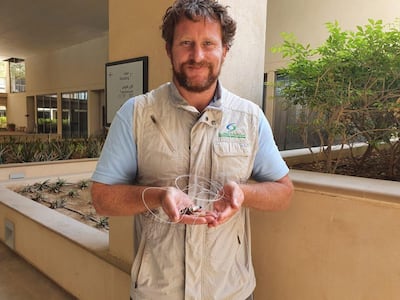Marine experts removed fishing hooks caught in the fin of a whale shark in Abu Dhabi.
The five-metre juvenile shark has been navigating the canals near Al Raha Beach, on the outskirts of the capital, since mid-September.
Authorities have been monitoring the creature, which until recently was accompanied by a 12-metre adult, since it arrived.
They were satisfied it was happy and chasing plankton in the area.
But this week, residents spotted hooks and a fishing line tangled around one of the shark's fins.
Security staff in the area tipped off the Environment Agency Abu Dhabi and an employee jumped into the water to remove the fishing equipment on Sunday.
"There were three hooks and the sinker was a spark plug, so it wasn't the most sophisticated fishing operation," said Winston Cowie, marine policy manager at the agency, who removed the hook.
“We have noticed there are a few fishing lines in the area, which are used by people fishing from the side of the canal. They will put some bait out and they will leave their line out for the day and come and collect it.

“The shark swims quite close to the side of the canal, so what we think happened was it just got inadvertently caught on one of these as it passed and it kept going.”
Mr Cowie said the shark was not upset by the removal, which was filmed by Al Muneera residents Michael and Laurence Gibbs.
“It was quite a long fishing line,” said Ms Gibbs, from France.
Mr Gibbs, from the UK, said Mr Cowie was only in contact with the shark for about a second.
"He spotted the line tangled around the fin and removed it quickly," said Mr Gibbs.
Mr Cowie said the waters are green, which suggests there is a lot of plankton around, so the shark, which is believed to be 10 to 15 years old, appears to be happily feeding in the area.
"We have been monitoring it for three weeks. It doesn't appear to be distressed," he said.
“We will keep a close eye on it. But we may consider gently moving it on in the coming week or so, if it does hang around.”
Whale sharks usually remain in the deeper waters of the Arabian Gulf, but it is not unusual to see one or two in marinas in Abu Dhabi or Dubai at this time of the year.
Mr Cowie encouraged people to go and see the shark, but to keep a distance to avoid spooking it.
Whale sharks are the largest living species of shark and can grow up to 12 metres and weigh as much as 40 tonnes.
They have a broad, flattened head with stripes and spots on their bodies and rows of more than 300 tiny teeth.
They are, however, gentle giants and filter feeders, existing on krill and plankton.
Whale sharks are believed to live as long as 130 years and are found in all warm waters of the world, although there are only thought to be about 7,000 left in the wild.
Despite their size, some have been captured and displayed in aquariums. A female whale shark with extensive abrasions was rescued from shallow waters in 2008 and was briefly kept in Dubai’s Atlantis, The Palm. The aquarium released it in 2010.
A tracker monitoring her movements fell off after 33 days, when she was in the waters off the coast of Qatar.
The agency asked anyone who sees people fishing in Al Raha Beach area to report it on 800555.











